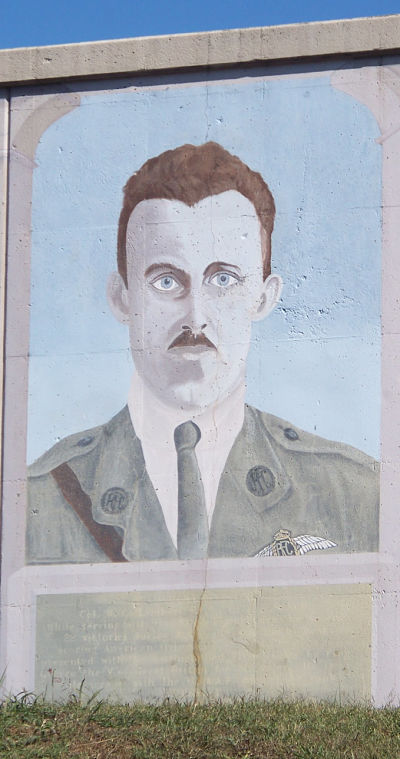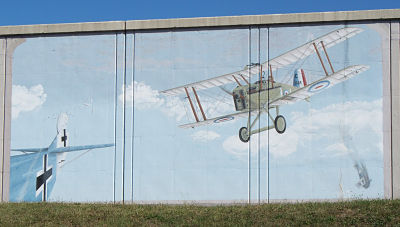 Colonel W. C. Lambert and one of his airplane battles are depicted in the mural painted by G. W. Lavendar on August 10, 1993. The mural was entitled “Memory of Valor.”
Colonel W. C. Lambert and one of his airplane battles are depicted in the mural painted by G. W. Lavendar on August 10, 1993. The mural was entitled “Memory of Valor.”
William C. Lambert was born on August 18, 1894 to William G. and Mary Lambert. At the age of ten or eleven, he received his first aviation experience. An aviator came to Ironton for a 4th of July Celebration. The aviator brought a Wright Flyer with him. A Wright Flyer was modeled after the Wright Brother’s first airplane. Young Lambert was given a ride by the aviator and allowed to handle the controls.
Lambert was employed as a chemist in Buffalo, New York as a young man. In 1915, he quit his chemist job to travel to Canada. In Canada, he enlisted in the British Artillery.
In 1917, Lambert joined the Canadian training unit of the Royal Flying Corps. The Royal Flying Corps (RFC) was founded in 1912 and first saw battle in 1914. For much of WWI, the RFC pilots faced an enemy with far superior aircrafts. In 1918, the RFC joined the RNAS (Royal Naval Air Service) to form the RAF (Royal Air Force).
Knowing what type of problems Lambert faced makes his record even more amazing. From April 7 to August 10, 1918, he shot down 21 ½ German Aircrafts. Counted in that number was two German balloons. The ½ was a downed plane where Lambert and another pilot shared credit for the downed aircraft. He engaged in aerial activity thirty-two times in that short period of time.
In 1916, Lambert was named Captain for his service.
In August 1918, Colonel Lambert was hospitalized for combat fatigue. He was eventually sent home.
Despite his illness, Colonel Lambert had the second most kills than any American pilot. He was awarded the Distinguished Flying Cross from England. In 1919, he presented the cross by the Prince of Wales in the British Embassy in Washington D. C.
After WWI ended, Lambert spent a year barnstorming. Barnstorming was very popular at that time. He would perform stunts or tricks with his airplane.
Barnstorming was not Lambert’s only occupation, he and a friend started an airplane building business and he flew the U. S. air mail route from Washington D. C. to Cleveland,Ohio.
On December 29, 1920, Colonel Lambert married Chloe Anne Hall Forson in Greenup County, Kentucky. Born in Kentucky to Mr. and Mrs. Whitt Hall, Chloe was a widow with a daughter, Clyda M.
In the 1920’s, Colonel Lambert enlisted in the United States Air Corps reserves. When WWII began, he was called to active duty. He served as an engineer. During World War II, Lambert was made a Lieutenant Colonel in the U. S. Airforce. In 1946, he was discharged from the airforce.
After World War II ended, Colonel Lambert returned to the reserves. He served as a reserve until 1954. He was 60 years old and a Lieutenant Colonel.
On February 9, 1971, Colonel Lambert’s wife, Chloe (Clo Ann) died at the Lawrence County General Hospital. The couple never had any children together.
In 1973, Colonel Lambert wrote his first book. Combat Report included his activities in western France during the war.
In 1980, Colonel Lambert published his second book, Barnstorming and Girls. A copy of this book can be found in the Phyllis Hamner Room in the Local Author Section.
On March 19, 1982, Colonel William C. Lambert died at the age of 87.

